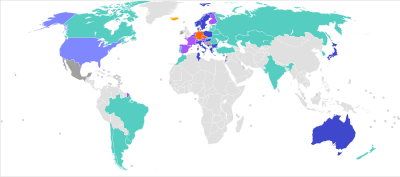|
Pirate Party
Pirate Party is a label adopted by various political parties worlwide,[1] characterized by a set of values and policies focused on civil rights, digital rights, internet freedom, and the promotion of inclusive, unrestricted innovation. At the heart of these positions is the defense of free access to and sharing of knowledge, opposition to intellectual monopolies, and the commitment to a digital governance that fosters direct and participatory democracy including e-democracy. Pirate parties advocate for reforming copyright and patent laws, aiming to make them more flexible and open in order to foster innovation and creativity while combating monopolists that profit from the restrictions imposed by the patent system. These parties are also strong proponents of free and open-source software, free sharing of content and knowledge (open content and open access), as well as the protection of individual privacy and information security, both online and offline. Furthermore, Pirate parties emphasize transparency, freedom of information, free speech, anti-corruption measures. Defending net neutrality is another key pillar, as is focusing on the protection of digital infrastructure from cyberattacks (cybersecurity). In contrast to many traditional political positions, Pirate parties reject the notion of cyber sovereignty, advocating instead an approach based on the free flow of information and the reduction of digital barriers between countries and reduce the influence of centralized entities. In this context, they promote a collaborative approach, which sees technological innovation as a global common good that should be accessible to all, free from government restrictions or interference from centralized actors, including Big Tech. They are also advocates of decentralized technologies and platforms such as blockchain and peer-to-peer networks, promoting forms of self-regulation in cyberspaces. These parties strongly defend strong encryption and anonymity as essential tools to protect personal data and privacy against mass surveillance, censorship, and the abuse of power by large tech companies.[2][3][4][5][6][7] Protecting individual freedom is at the core of their political agenda, seen as a bulwark against the growing power of corporations and governments in controlling information and digital autonomy. The Pirate Party's libertarian philosophy centers on the belief that the Internet should remain an open, public space where individuals can freely access, create, and share content, free from government censorship or corporate control. They argue that any interference in cyberspace, whether by the state or private corporations, infringes on the fundamental right to live and express oneself without fear or coercion. The Pirate Party advocates for the right of citizens to voice their opinions openly, regardless of whether those opinions are controversial or unpopular. This commitment to freedom of expression and individual autonomy aligns closely with the principles of civil libertarianism and cyberlibertarianism, reinforcing the idea that the digital realm must remain a space of unfettered personal liberty and self-determination.[8] While the name pirate party originally alluded to online piracy, members have made concerted efforts to connect pirate parties to all forms of piracy, from pirate radio to the Golden Age of Pirates. Pirate parties are often considered outside of the economic left–right spectrum or to have context-dependent appeal.[9] HistoryThe first Pirate Party to be established was the Pirate Party of Sweden (Swedish: Piratpartiet), whose website was launched on 1 January 2006 by Rick Falkvinge. Falkvinge was inspired to found the party after he found that Swedish politicians were generally unresponsive to Sweden's debate over changes to copyright law in 2005.[10] The United States Pirate Party was founded on 6 June 2006 by University of Georgia graduate student Brent Allison. The party's concerns were abolishing the Digital Millennium Copyright Act, reducing the length of copyrights from 95 years after publication or 70 years after the author's death to 14 years, and the expiry of patents that do not result in significant progress after four years, as opposed to 20 years. However, Allison stepped down as leader three days after founding the party.[11] The Pirate Party of Austria (German: Piratenpartei Österreichs) was founded in July 2006 in the run-up to the 2006 Austrian legislative election by Florian Hufsky and Jürgen "Juxi" Leitner.[12] The Pirate Party of Finland was founded in 2008 and entered the official registry of Finnish political parties in 2009. The Pirate Party of the Czech Republic (Czech: Česká pirátská strana) was founded on 19 April 2009 by Jiří Kadeřávek. The 2009 European Parliament election took place between the 4 and 7 June 2009, and various Pirate Parties stood candidates. The most success was had in Sweden, where the Pirate Party of Sweden won 7.1% of the vote, and had Christian Engström elected as the first ever Pirate Party Member of European Parliament (MEP).[13][14] Following the introduction of the Treaty of Lisbon, the Pirate Party of Sweden were afforded another MEP in 2011, that being Amelia Andersdotter. On 30 July 2009, the Pirate Party UK was registered with the Electoral Commission. Its first party leader was Andrew Robinson, and its treasurer was Eric Priezkalns.[15][16][17] In April 2010, an international organisation to encourage cooperation and unity between Pirate Parties, Pirate Parties International, was founded in Belgium.[18] In the 2011 Berlin state election to the Abgeordnetenhaus of Berlin, the Pirate Party of Berlin (a state chapter of Pirate Party Germany) won 8.9% of the vote, which corresponded to winning 15 seats.[19][20] John Naughton, writing for The Guardian, argued that the Pirate Party of Berlin's success could not be replicated by the Pirate Party UK, as the UK does not use a proportional representation electoral system.[21] In the 2013 Icelandic parliamentary election, the Icelandic Pirate Party won 5.1% of the vote, returning three Pirate Party Members of Parliament. Those were Birgitta Jónsdóttir for the Southwest Constituency, Helgi Hrafn Gunnarsson for Reykjavik Constituency North and Jón Þór Ólafsson for Reykjavik Constituency South.[22][23] Birgitta had previously been an MP for the Citizens' Movement (from 2009 to 2013), representing Reykjavik Constituency South. As of 2015[update], it was the largest political party in Iceland, with 23.9% of the vote.[24] The 2014 European Parliament election took place between 22 and 24 May. Felix Reda was at the top of the list for Pirate Party Germany, and was subsequently elected as the party received 1.5% of the vote. Other notable results include the Czech Pirate Party, who received 4.8% of the vote, meaning they were only 0.2% shy of getting elected, the Pirate Party of Luxembourg, who received 4.2% of the vote, and the Pirate Party of Sweden, who received 2.2% of the vote, but lost both their MEPs.[25] Reda had previously worked as an assistant in the office of former Pirate Party MEP Amelia Andersdotter.[26] On 11 June 2014, Reda was elected vice-president of the Greens/EFA group in the European Parliament.[27] Reda was given the job of copyright reform rapporteur.[28] The Icelandic Pirate Party was leading the national polls in March 2015, with 23.9%. The Independence Party polled 23.4%, only 0.5% behind the Pirate Party. According to the poll, the Pirate Party would win 16 seats in the Althing.[29][30] In April 2016, in the wake of the Panama Papers scandal, polls showed the Icelandic Pirate Party at 43% and the Independence Party at 21.6%,[31] although the Pirate Party eventually won 15% of the vote and 10 seats in the 29 October 2016 parliamentary election. In April 2017, a group of students at University of California, Berkeley formed a Pirate Party to participate in the Associated Students of the University of California senate elections, winning the only third-party seat.[32] The Czech Pirate Party entered the Chamber of Deputies of the Czech Parliament for the first time after the election held on 20 and 21 October 2017, with 10.8% of the vote. The Czech Pirate Party, after finishing in second place with 17.1% of the vote in the 2018 Prague municipal election held on 5 and 6 October 2018, formed a coalition with Prague Together and United Forces for Prague (TOP 09, Mayors and Independents, KDU-ČSL, Liberal-Environmental Party and SNK European Democrats). The representative of the Czech Pirate Party, Zdeněk Hřib, was selected to be Mayor of Prague. This was probably the first time a pirate party member became the mayor of a major world city. At the 2019 European Parliament election, three Czech Pirate MEPs and one German Pirate MEP were voted in and joined the Greens–European Free Alliance, the aforementioned group in the European Parliament that had previously included Swedish Pirate MEPs and German Julia Reda. Copyright and censorshipSome campaigns have included demands for the reform of copyright and patent laws.[33] In 2010, Swedish MEP Christian Engström called for supporters of amendments to the Data Retention Directive to withdraw their signatures, citing a misleading campaign.[34] International organizations Elected in EU Parliament Elected nationally Elected locally Registered for elections Registered in some administrative regions Unregistered but active Status unknown Pirate Parties InternationalPirate Parties International (PPI) is the umbrella organization of the national Pirate Parties. Since 2006, the organization has existed as a loose union[35] of the national parties. Since October 2009, Pirate Parties International has had the status of a non-governmental organization (Feitelijke vereniging) based in Belgium. The organization was officially founded at a conference from 16 to 18 April 2010 in Brussels, when the organization's statutes were adopted by the 22 national pirate parties represented at the event.[36] European Pirate PartyThe European Pirate Party (PPEU) is a European political alliance founded in March 2014 which consists of various pirate parties within European countries.[37] It is not currently registered as a European political party.[38] Parti Pirate FrancophoneIn Parti Pirate Francophone, the French-speaking Pirate Parties are organized. Current members are the pirates parties in Belgium, Côte d'Ivoire, France, Canada, and Switzerland.[39] European Parliament elections2009
2013
*Held in 2013 due to Croatia's entry into EU 2014
1Party only participated in North West England constituency 2019
2024
National elections
Elected representativesRepresentatives of the Pirate Party movement that have been elected to a national or supranational legislature.
 Since the 2021 Czech legislative election, the following 4 MPs are in office:
The following served as MPs during the 2017–2021 term:
Since the 2024 Czech senate election, the party has 1 senator:
The following are former senators:
Since the 2024 EU elections, the party has 1 MEP:
The following are former MEPs:
Since the 2024 EU elections, the party does not have any national elected representatives. The former MEPs are as follows:
Since the 2024 parliamentary election, the party does not have any national elected representatives. The former MPs are as follows:
National partiesOutside Sweden, pirate parties have been started in over 40 countries,[46] inspired by the Swedish initiative. See also
References
External linksWikimedia Commons has media related to Pirate parties.
|
|||||||||||||||||||||||||||||||||||||||||||||||||||||||||||||||||||||||||||||||||||||||||||||||||||||||||||||||||||||||||||||||||||||||||||||||||||||||||||||||||||||||||||||||||||||||||||||||||||||||||||||||||||||||||||||||||||||||||||||||||||||||||||||||||||||||||||||||||||||||||||||||||||||||||||||||||||||||||||||||||||||||||||||||||||||||||||||||


